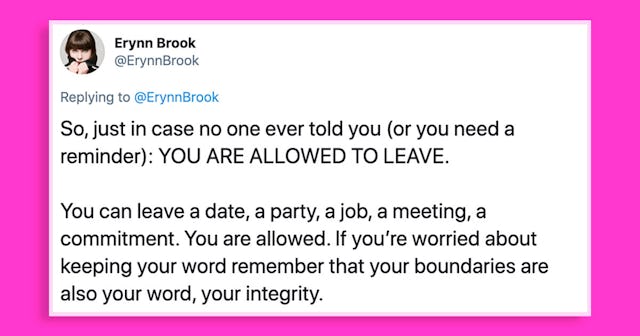You Are Allowed To Leave—This Thread Is #parentgoals (And A Great Reminder)

Talking about consent and teaching our children to create boundaries while respecting the boundaries of others can be a daunting task. But the conversation needs to start early and it should happen often. Consent isn’t just about sex, though; it’s about listening to our gut and understanding what we really want, versus what we feel obligated or pressured into doing. It’s about checking in with people around you to see what they want and then respecting their answer. To help our kids and ourselves navigate tricky situations when our feelings make us or the people around us uncomfortable, we need to consistently remember to not put someone else’s comfort or desires over our own. A Twitter thread by Erynn Brook went viral because she had a mother who was adamant about telling her, “You can leave if you want to.”
Erynn Brook explains that when she went to her first sleepover as a child, her mother told her she could come home whenever she wanted to without having to explain herself. Brook just had to let her friend’s parent know and then call her mother; she would pick her up no matter what time it was. Brook remembers that this didn’t go over well. The friend and friend’s mom tried to get her to stay, blamed her for upsetting her daughter, and then apologized to Brook’s mom when she showed up in pajamas to take Brook home. But Erynn Brook’s mother said, “Don’t apologize for my daughter. I want her to know she’s allowed to leave and I’ll be there for her any time.” This message stayed with Brook, and her mother used this same sentiment to guide her through leaving a toxic work environment and setting boundaries with friends.
As Brook got older she realized that the autonomy and agency she was taught to have over her body and feelings isn’t the norm. The idea that it’s okay to leave an uncomfortable situation shouldn’t be radical, yet it is, because so many of us are taught to be polite, patient, and quiet. We are supposed to grin and bear our way through certain events because making a scene is frowned upon; heaven forbid we offend anyone or bruise an ego or two. Putting ourselves first shouldn’t be considered selfish. If we can’t give our kids permission to leave a party, sleepover, or playdate when their guts tell them it’s time to go, then how can we teach them and encourage them to say no or walk away from more dangerous and harmful situations? I want my kids to trust their Spidey Sense when they aren’t ready for, or don’t want, the drugs, alcohol, or sex offered or forced onto them. And I want them to trust that I will always be there to help. That trust can only come if I trust my kids and validate their feelings when they do tell me they are uncomfortable.
It can be tricky to balance accountability and responsibility with autonomy. My kids have used my lectures on consent and comfort as a way to try to get out of showers, school, and soccer practices. When they complain about not wanting to do something they tell me it’s their choice and their body. I acknowledge that they are correct, however keeping clean is taking care of our body and if they don’t want to get into the tub that exact minute, then when? If time is flexible, I try to negotiate. Going to school is a privilege and will help them earn an education that will give them more opportunities and choices. If there is something I can do to help make their experience better, I’m willing to help.
Not everything in life is going to be fun and comfortable, but hard work and working within certain rules isn’t the same as being forced to compromise your beliefs and give up emotional and physical consent. And I have always told my kids that they can stop a sport or activity, but they need to be the one to show up to practice to talk to their coach, teammates, or instructor. If something isn’t working, then it’s up to them to use their words either to make changes or to let them know their intentions.
monkeybusinessimages/Getty
I try to make it clear that being uncomfortable does not always mean being unsafe. But when you are uncomfortable in order to make everyone around you feel good or better that’s a sign that your boundaries are being compromised and you are no longer in a consensual position. It has taken me a lifetime to learn that I’m not responsible for the feelings of the people around me. Stating my wants, needs, and expectations isn’t rude; it’s an important part of self-love and protection. I lived too long in abuse and was expected to put other people’s needs and emotions before my own. I was never told it was okay to walk away. I was never allowed to be anything but agreeable so I internalized toxicity until the poison slowly started to threaten my life. I don’t want my kids to spend chunks of their lives unpacking trauma that never should have been put in the box to begin with.
I’m telling you as much as I’m telling myself and my kids this amazing message and reminder from Erynn Brook: “You can leave a date, a party, a job, a meeting, a commitment. You are allowed. If you’re worried about keeping your word remember that your boundaries are also your word, your integrity.”
If something doesn’t feel right, you’re allowed to leave.
This article was originally published on